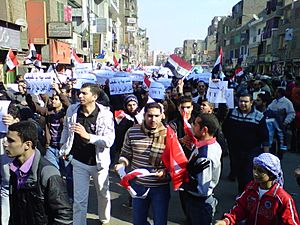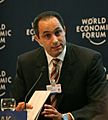2011 Egyptian revolution facts for kids
In the 2011 Egyptian revolution, many protests and large gatherings happened in Egypt. It was also called The Day of Anger and The Day of Revolt. It started on January 25, 2011.
Before these protests, there was a big uprising in Tunisia. In the weeks that followed, similar protests began in Egypt. People who started these protests hoped that the success in Tunisia would encourage Egyptians to join in and work together for change. Protests took place in major cities like Cairo, Alexandria, Suez, and Ismailiya.
On the first day of the protests, the Egyptian government tried to control information. They limited what was shown on most media like newspapers and news channels inside Egypt. The government also tried to block many social media websites, which protesters had used to share news and organize. On January 28, the Internet and cell phone services were completely shut down across Egypt. However, cell phone service was restored early the next morning.
By January 29, about 1,000 people had been arrested. Also, more than 1,000 protesters were hurt, and at least 53 people had died.
People protested for many different reasons. They were upset about things like:
- police brutality (when police use too much force)
- state of emergency laws (rules that give the government special powers and limit people's rights)
- Not having free elections (where people can choose their leaders fairly)
- Corruption (when people in power use their position for personal gain)
- Limits on freedom of speech (not being allowed to say what you think)
- High unemployment (many people not having jobs)
- Low minimum wages (not earning enough money to live)
- Not having enough housing
- Food price inflation (food becoming too expensive)
- Poor living conditions
Mohamed ElBaradei, a well-known figure, suggested that one main goal of the revolution was to make Hosni Mubarak step down as president. Many people saw ElBaradei as a possible leader for a new government.
Before 2011, protests happened often, but they were usually small and stayed in one area. However, on January 25, 2011, large protests and riots broke out all over the country. This day became known as the "Day of Anger." Different Egyptian groups who wanted change, and other activists, had chosen this date for a big demonstration. The 2011 protests were called "unprecedented" for Egypt. This means nothing like them had ever happened before. They were also described as the "largest display of popular dissatisfaction in recent memory." These were the biggest protests in Egypt since the 1977 Egyptian Bread Riots. For the first time, Egyptians from all walks of life, different money situations, and different religions joined together to protest.
During the protests, the capital city of Cairo was described as "a war zone." In the port city of Suez, there were many violent clashes between protesters and police. The Egyptian government used different ways to try and stop the protests. Anti-riot police used shields, rubber bullets, batons, water cannons, and tear gas. Sometimes, they also used live ammunition. Most of the police actions were not meant to kill, but some people did die. The government also turned off internet access and set a curfew (a time when people had to stay indoors). The government said they needed to do this to keep order and prevent Islamic fundamentalist groups from gaining power.
Many people around the world became very interested in the protests in Egypt. This was partly because of social media platforms like Twitter, Facebook, and YouTube. Activists and people interested in the protests used these platforms to talk to each other, work together, and share what was happening. As the protests gained more attention, the Egyptian government tried even harder to limit people's access to the Internet, especially social media.
On February 11, 2011, President Mubarak resigned from his position. Later, he was ordered to stand trial. He was found guilty and sentenced to life in prison.
Books About the Revolution
- The Egyptian revolution, by the political writer Ahmed Ghanem.
- A book in French about the revolution, called "La révolution égyptienne" written by Ahmed Ghanem.
Important Activists
- Ahmed Ghanem
- Asmaa Mahfouz
- Israa Abdel-Fattah
Images for kids
-
Hosni Mubarak in 2009
-
Protest in Tahrir Square, 4 February
See also
 In Spanish: Revolución egipcia de 2011 para niños
In Spanish: Revolución egipcia de 2011 para niños
 | Stephanie Wilson |
 | Charles Bolden |
 | Ronald McNair |
 | Frederick D. Gregory |














